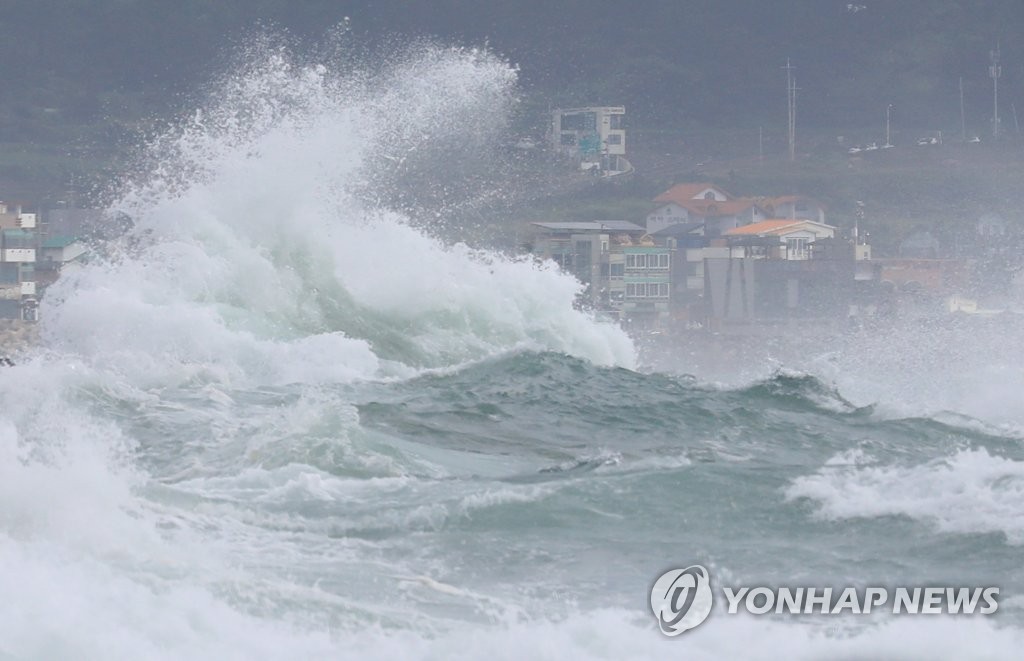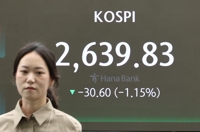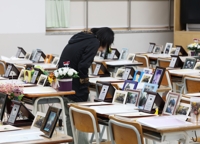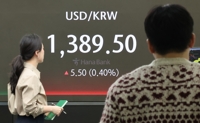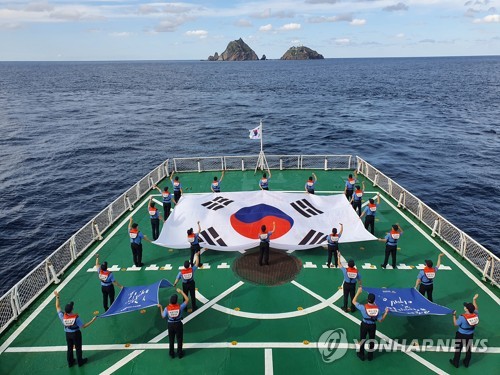(LEAD) Typhoon Bavi to affect most of S. Korea at night
(ATTN: RECASTS headline, lead; UPDATES details, photos throughout)
SEOUL, Aug. 26 (Yonhap) -- Typhoon Bavi, one of the year's most powerful typhoons, was expected to affect most of the country later this evening after passing through waters near the southern resort island of Jeju in the afternoon, the weather agency said Wednesday.
The tropical storm has developed into a powerful typhoon as of 9 a.m. and was approaching the country at a speed of 19 kilometers per hour, according to the Korea Meteorological Administration (KMA). Its maximum wind speed was 45 meters per second.
BAVI, the strongest typhoon of 2020 threatens Korea
Youtubehttps://youtu.be/lb-WO207sh4
A wind speed of 35 mps can derail trains, and if it exceeds 40 mps, the wind can even topple cars and huge rocks.
A typhoon advisory has been put in place for Jeju and parts of South Jeolla Province on Wednesday, with the whole country expected to go under the influence of the typhoon later in the day.
Bavi was expected to hit the country's western region more severely as it passes through the Yellow Sea.
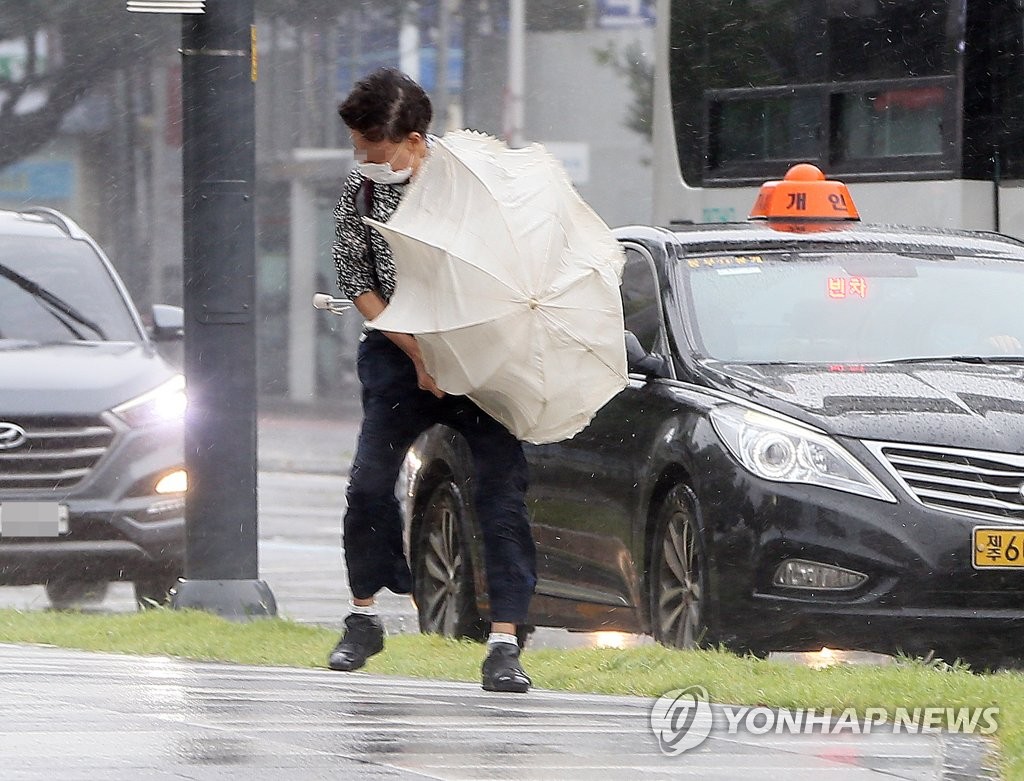
A pedestrian struggles to hold onto an umbrella due to strong winds in the southern resort island of Jeju on Aug. 26, 2020. (Yonhap)
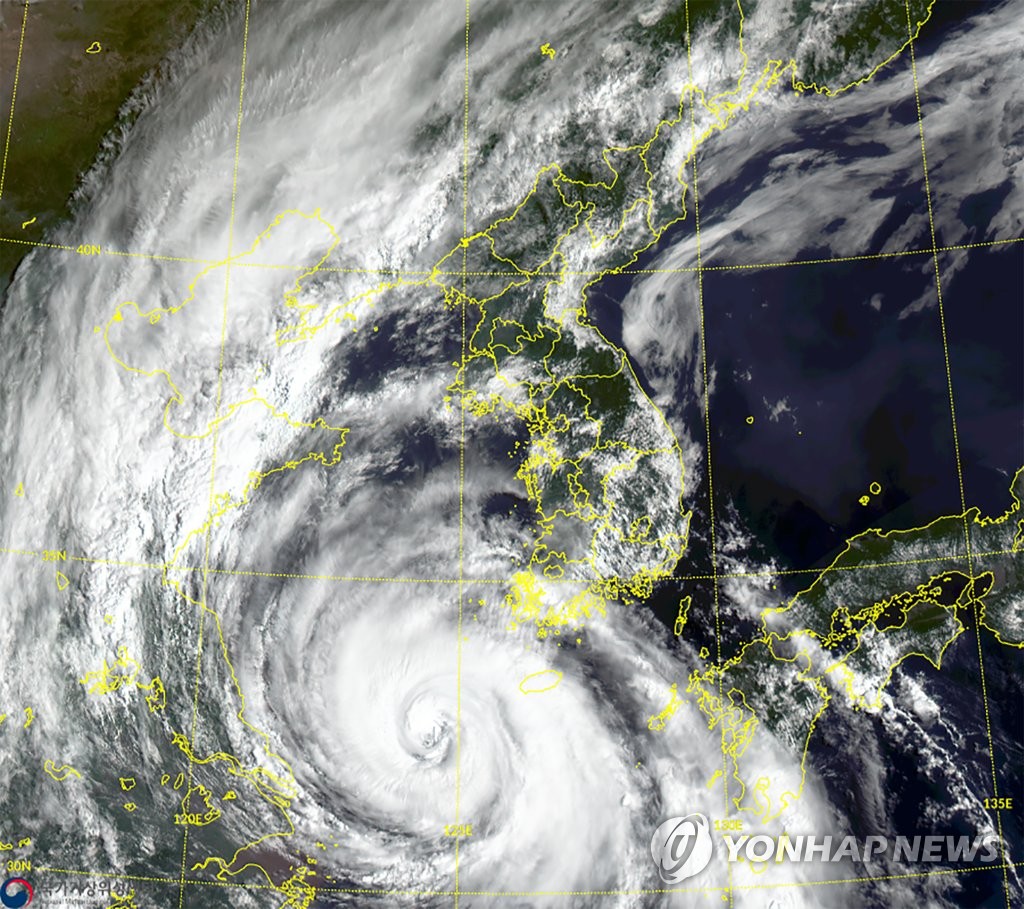
This satellite image, provided by the National Meteorological Satellite Center, shows Typhoon Bavi moving toward South Korea on Aug. 26, 2020. (PHOTO NOT FOR SALE)(Yonhap)
The country's southern coastal regions have come under the influence of the tropical storm, with strong wind of 25 mps and rain of 20 mm per hour hitting the affected areas. In one area in Seogwipo, heavy rain measuring 101.5 mm poured between midnight and 6 a.m.
Heavy rain of more than 500 mm and strong gusts with maximum instantaneous wind speeds of 40 to 60 mps were expected in Jeju, according to the KMA.
Flights and ferry routes connecting the southern resort island have been canceled due to the typhoon advisory.
All 330 flights that were scheduled to arrive or depart from Jeju International Airport until 3 p.m. have been called off. The number could increase when flights after 3 p.m. are also canceled.
"Flight operation could resume later in the afternoon depending on the location of the typhoon and weather circumstances. We cannot confirm a certain time at the moment," an airport official said.
Fifteen ferries leaving from Jeju have also been canceled, with more than 1,900 ships docked at the island's ports ahead of the tropical storm.
Trekking routes at Mount Halla, the island's highest peak, have also been restricted.
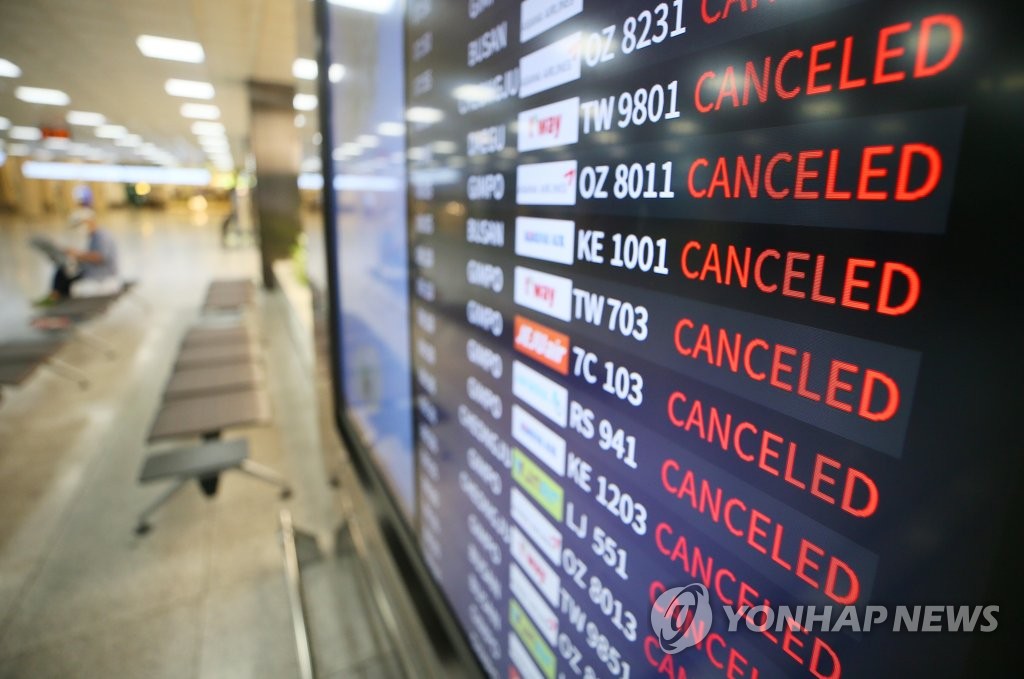
An electronic board at Jeju International Airport shows flights that were canceled due to Typhoon Bavi on Aug. 26, 2020. (Yonhap)
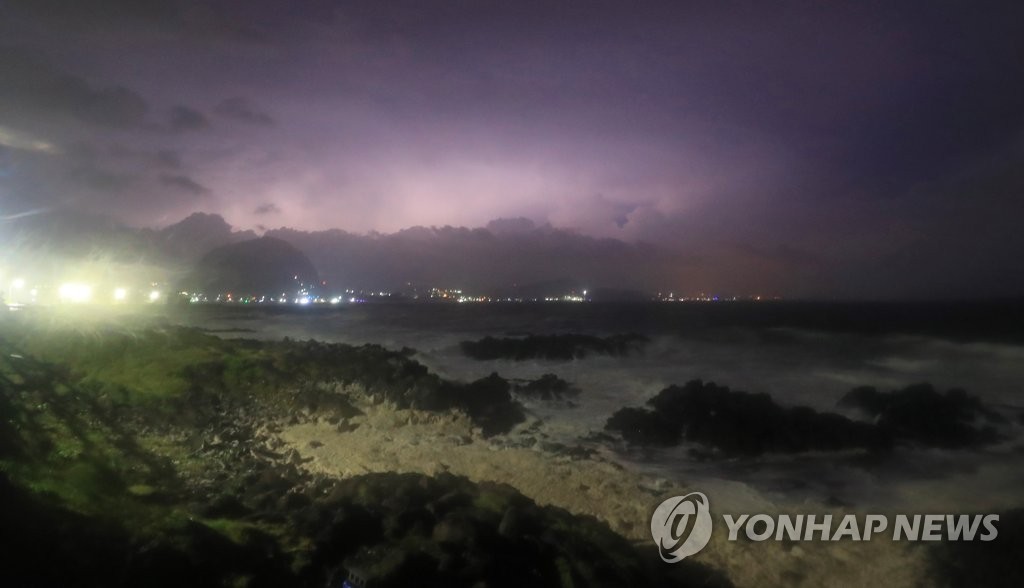
Seogwipo, a city in the southern part of Jeju Island, comes under the influence of Typhoon Bavi on Aug. 26, 2020. (Yonhap)
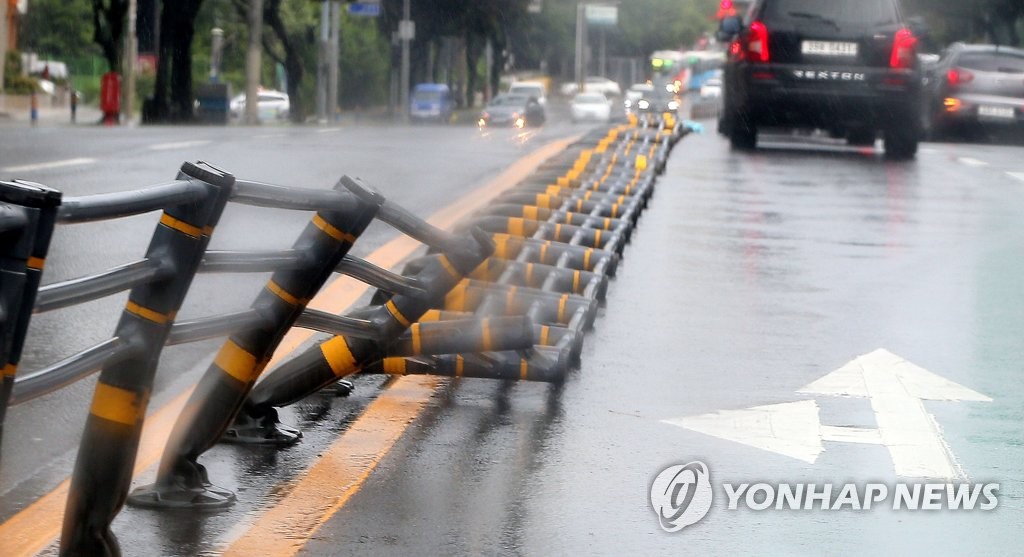
A road facility on the southern resort island of Jeju is damaged by strong winds on Aug. 26, 2020. (Yonhap)
Flights have also been canceled at airports in Seoul, Gimhae and Ulsan.
More than 50 flights scheduled to depart from Gimpo International Airport and arrive at Gimhae and Jeju have been canceled, according to the Korea Airports Corp.
"Please prepare thoroughly as the strong winds can affect outdoor screening centers, construction sites and power facilities. This could prompt secondary damage as well as trigger losses at farms," the KMA said.
mlee@yna.co.kr
(END)
-
 Defense chief says N. Korea's hypersonic missile 'unsuccessful' in last-stage glide flight
Defense chief says N. Korea's hypersonic missile 'unsuccessful' in last-stage glide flight -
 Ex-PM suffers crushing defeat
Ex-PM suffers crushing defeat -
 Man in his 40s nabbed for spray-painting slurs toward ex-President Moon
Man in his 40s nabbed for spray-painting slurs toward ex-President Moon -
 Police catch 1,681 over alleged election law violations
Police catch 1,681 over alleged election law violations -
 PPP lawmaker says entire Cabinet should resign over general elections defeat
PPP lawmaker says entire Cabinet should resign over general elections defeat
-
 Defense chief says N. Korea's hypersonic missile 'unsuccessful' in last-stage glide flight
Defense chief says N. Korea's hypersonic missile 'unsuccessful' in last-stage glide flight -
 Ruling party leader resigns following election defeat
Ruling party leader resigns following election defeat -
 (LEAD) Yoon vows to improve communication with people after election defeat
(LEAD) Yoon vows to improve communication with people after election defeat -
 N.K. leader vows to deal 'death-blow' to enemy in event of confrontation: KCNA
N.K. leader vows to deal 'death-blow' to enemy in event of confrontation: KCNA -
 Yoon presides over emergency meeting on Mideast crisis
Yoon presides over emergency meeting on Mideast crisis
-
 N. Korea has capability to genetically engineer biological military products: U.S. report
N. Korea has capability to genetically engineer biological military products: U.S. report -
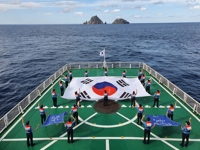 (LEAD) S. Korea 'strongly' protests Tokyo's renewed claims to Dokdo, calls in Japanese diplomat
(LEAD) S. Korea 'strongly' protests Tokyo's renewed claims to Dokdo, calls in Japanese diplomat -
 (3rd LD) U.S. unveils US$6.4 bln in CHIPS Act grants to Samsung Electronics
(3rd LD) U.S. unveils US$6.4 bln in CHIPS Act grants to Samsung Electronics -
 (LEAD) Yoon vows to improve communication with people after election defeat
(LEAD) Yoon vows to improve communication with people after election defeat -
 (LEAD) Yoon to address election defeat Tuesday
(LEAD) Yoon to address election defeat Tuesday

